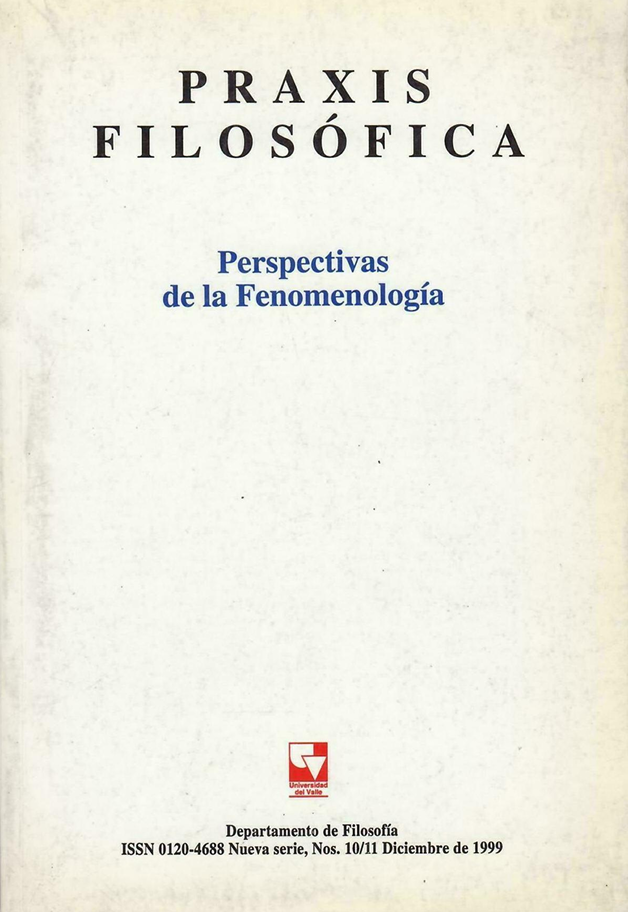What does it mean to think phenomenologically?
Main Article Content
In this paper the author seeks a twofold purpose: on the one hand, the explanation of the most significant feature of the phenomenological way doing philosophizing, namely, the elucidation of the meaning and the importance of thinking; on the other hand, but at the same time, he brings forth some personal elements concerning the nature of rationality, and the elements of what he calls an ontology of possibilities, as an upshot of the right understanding of thinking in a phenomenological sense.
BERNET, R., Kern, I., MARBACH, E., (1989). Edmund Husserl. Darstellung seines Denkens. Hamburg: Felix Meiner Verlag
FUNKE, G., (1987). Fenomenología: ¿metafísica o método? Caracas: Monte Avila Editores.
HEIDEGGER, M., (1984). ¿Was heisst denken? Tübingen: Max Niemeyer Verlag
HEIDEGGER, M., (1986). Sein und Zeit. Tübingen: Max Niemeyer Verlag
HEIDEGGER, M., (1968). "El fin de la filosofía y las tareas del pensar", en: Sartres, Heidegger, Jaspers y otros, Kierkeggard vivo. Madrid: Alianza Editorial.
HUSSERL, E., (1968). Logische Untersuchungen. Tübingen: Max Niemeyer Verlag
HUSSERL, E., (1976). Ideen zu einer reinen Phänomenologie und phänomenologischen Philosophie. Erstes Buch: Allgemeine Einführung in die reine Phänomenologie, Hua III, 1. Den Haag: Martinus Nijhoff.
HUSSERL, E., (1952). Ideen zu einer reinen Phänomenologie und phänomenologischen Philosophie. Zweites Buch: Phänomenologische Untersuchungen zur Konstitution, Hua IV. Den Haag: Martinus Nijhoff.
KANT, I., (1982). ¿Qué significa orientarse en el pensar? Buenos Aires: Leviatan
KANT, I., (1975). Idee und Methode der Philosophie. Leitgedanken für eine Theorie der Vernunft. Berlin: Walter de Gruyter.
MALDONADO, C. E., (1994). Fenomenología y conciencia de tiempo. Santafé de Bogotá: Ediciones Universidad de la Sabana.
MALDONADO, C. E., (1996). Introducción a la fenomenología a partir de la idea de mundo. Santafé de Bogotá: CEJA,
MALDONADO, C. E., (1993). "El pensar como origen", en: Universitas Philosophica, No. 21.
MALDONADO, C. E., (1997) "Necesidad de la razón", en: Revista Estudos Leopolden-ses. Serie Ciencias Humanas, No. 152, vol. 34, Unisinos, Sao Leopoldo, Brasil.
MELEAU-Ponty, M., (1945). Phénoménologie de la perception. Gallimard.
MELEAU-Ponty, M. (1962). L'oeil et l'esprit. Gallimard.
MELEAU-Ponty, M. (1964). Le visible et l'invisible. Gallimard.
RICOEUR, P., (1987). A l'école de la phénoménologie. J. Vrin
SARTRE, J. P., (1968). La trascendencia del ego, Buenos Aires: Ediciones Calden
SARTRE, J. P., (1942). L'Etre et le Neant. Gallimard.

This work is licensed under a Creative Commons Attribution-NonCommercial-ShareAlike 4.0 International License.
De acuerdo con nuestra política (Licencia Creative Commons CC BY-NC-SA 4.0) los artículos presentados y sometidos al proceso editorial en la revista Praxis Filosófica no tienen costo alguno para sus autores ni retribuciones económicas para la revista. El artículo de carácter inédito, producto de investigación o de algún proyecto que se presente a Praxis Filosófica, no podrá estar sometido a otro proceso de publicación durante el proceso que se lleve en nuestra revista.





